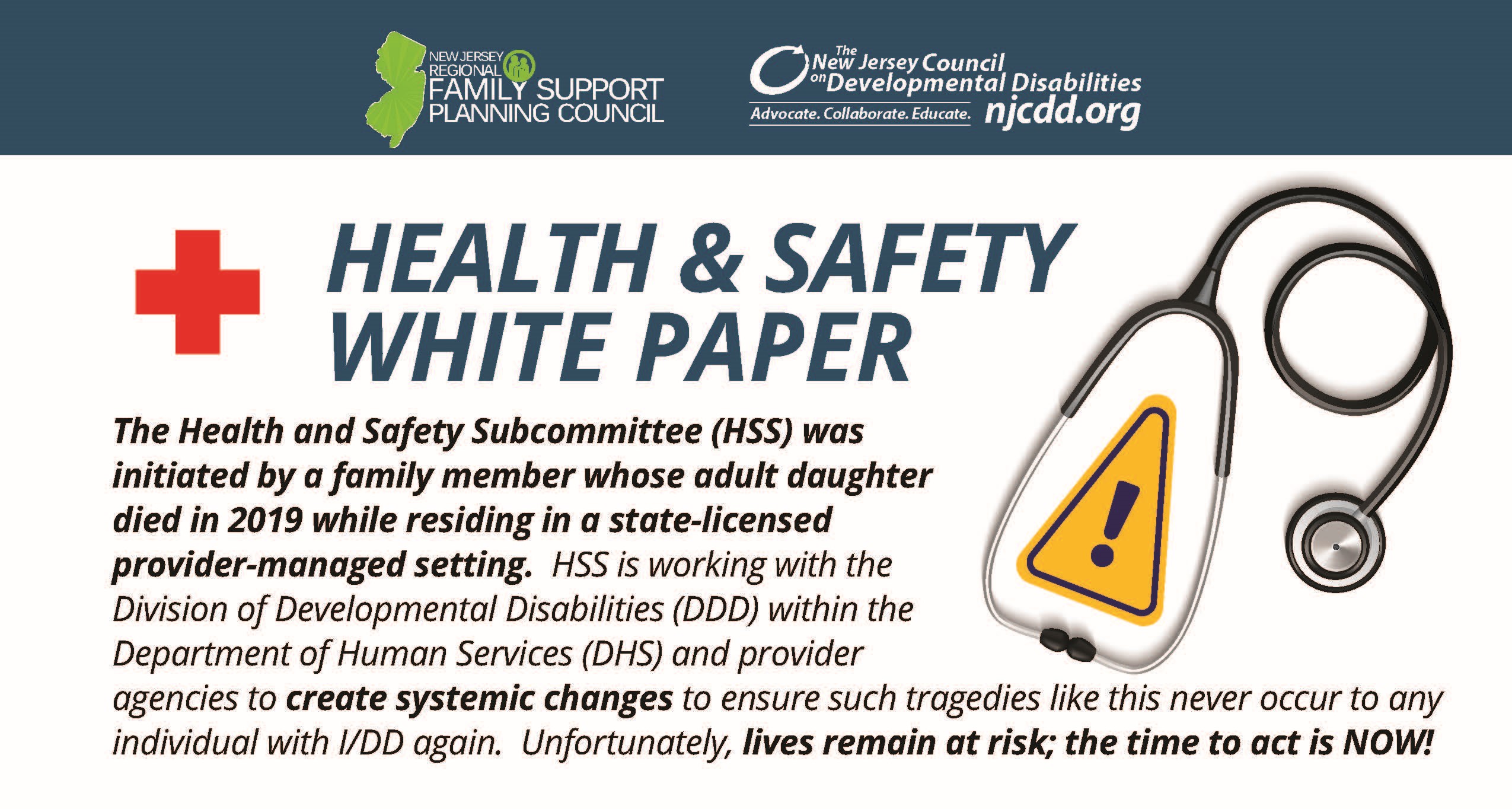 Summary of Health and Safety Subcommittee’s White Paper: Recommendations to Improve the Health and Safety of Individuals with Intellectual and Developmental Disabilities Who Receive Services from the New Jersey Division of Developmental Disabilities
Summary of Health and Safety Subcommittee’s White Paper: Recommendations to Improve the Health and Safety of Individuals with Intellectual and Developmental Disabilities Who Receive Services from the New Jersey Division of Developmental Disabilities
Download the HSS White Paper Here
The Health and Safety Subcommittee (HSS) was initiated by a family member whose adult daughter died in 2019 while residing in a state-licensed provider-managed setting. HSS is working with the Division of Developmental Disabilities (DDD) within the Department of Human Services (DHS) and provider agencies to create systemic changes to ensure such tragedies like this never occur to any individual with I/DD again. Unfortunately, lives remain at risk; the time to act is NOW!
Individuals with I/DD who live in provider-managed settings and have co-occurring medical needs require individualized healthcare oversight.
The risk for a poor outcome intensifies for some individuals who lack the ability to communicate a health-related issue to the Direct Support Professional (DSP). The DSPs caring for persons with I/DD are generally inexperienced and/or receive limited training about common healthcare needs specific to the I/DD population. The lack of necessary staff training places the individual with I/DD in danger of serious illness and even death.
HSS has encouraged family involvement and seeks to create a partnership that includes families, DDD, provider agencies and self-advocates to construct a system of services and supports with appropriate oversight, transparency and accountability to ensure timely and appropriate healthcare interventions and improved health and safety outcomes for individuals with I/DD, co-occurring medical/behavioral conditions, and emerging healthcare needs.
Following is a brief summary highlighting some of the desperately needed systemic changes.
1. Improve Health Outcomes by avoiding preventable illnesses, injuries, and deaths.
• Require comprehensive DSP training on prevention and what to do for the most common causes of fatalities in the IDD population and require documentation of DSP competency by qualified professionals.
• Require DSPs to record health data (such as weight fluctuations, diet, intake/output, and symptoms of illness) daily with individual parameters that warrant reporting irregularities to a health care professional.
• Require the annual ISP meeting to include the development, review, and revision of the individual’s measurable health outcomes and a plan to address health and safety needs.
• Require providers to publish reports on aggregate results of health outcome achievements for consumers.
2. Require implementation of electronic health records.
• Make transparent documentation of health and safety-related records to be readily accessible to guardians, within agencies, and state entities via a dashboard (secure portal) for monitoring and surveillance of unsafe conditions.
• Require independent external evaluation of health and safety records.
3. Improve provider-individual-family relationships through transparency and collaboration.
• Require providers to give procedure and policy manuals to individuals, families/guardians annually.
• Ensure that individuals’ rights are protected by requiring providers to seek input from guardians whenever an individual is unable to communicate needs, signs of illness, or unsafe circumstances. https://nj.gov/humanservices/ddd/documents/Family-Provider-Relations.pdf
• Require guardians (who have not given passive consent) to be consulted for issues related to health and safety to ensure trauma-informed care is provided.
• Require full access to health records to guardians.
• Require independent authorities outside of DHS to mediate unresolved issues following internal grievance procedures and to investigate complaints by individuals or guardians.
4. Eliminate abuse, neglect, and/or exploitation
• Require surveillance for potential risks and investigation of suspected incidents of abuse/exploitation and neglect to be conducted by a multidisciplinary team of qualified professionals.
• Improve provider transparency by increasing the requirements for communication of potential risks to guardians, DDD, and state monitors (Office of Program Integrity and Accountability) such as inadequate staffing, unsafe conditions, and incident reports.
• Ensure provider compliance and effective enforcement of Standards for Community Care Residences and the federal regulation requirements for Home and Community Based Settings (HCBS).
